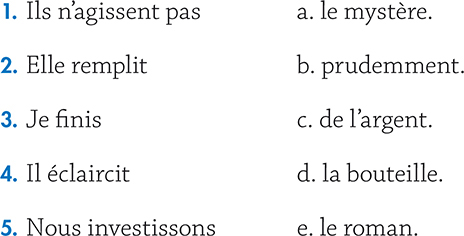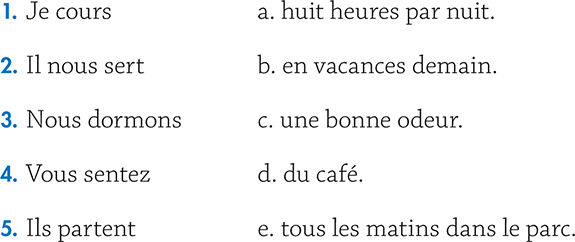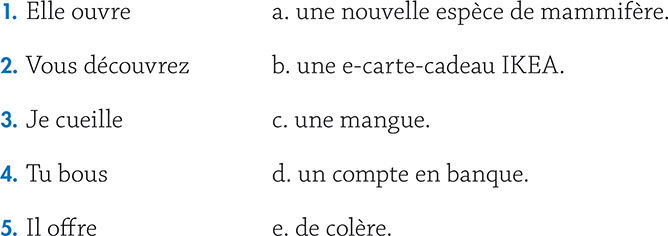5 Asking Questions and Talking About the Immediate Past
Your French journey would be not nearly as much fun if you couldn’t ask precise questions. Whether you’re at the market, at a friend’s house, or in a restaurant, you’ll want to have a variety of question words at your disposal. The following list is a comprehensive overview of the most commonly used question words, known as interrogatives, and they will help you jump into any conversation.
This chapter is also a treasure trove of verbs, verbs that will help you answer questions, as well as ask them. Allons-y!
Question Words
Like in English, questions words are placed at the start of a question. Here are some question words that will come in handy:
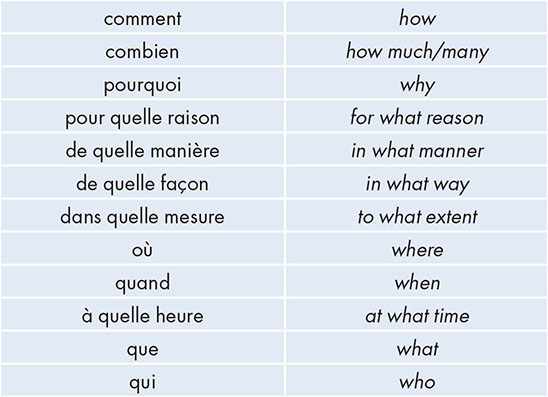

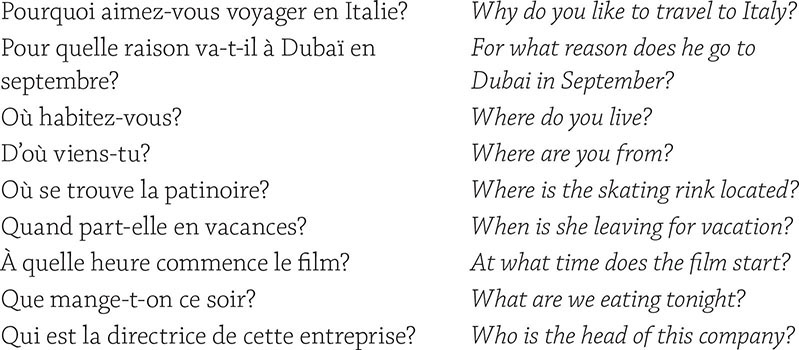
The -ir Verbs
The -ir verbs use two different conjugation patterns. One type of -ir verb drops the -ir of the infinitive; adds an -iss to the nous, vous, ils, and elles forms; and then adds the appropriate ending.

Many other verbs follow the same type of conjugation; so try your best to memorize them.
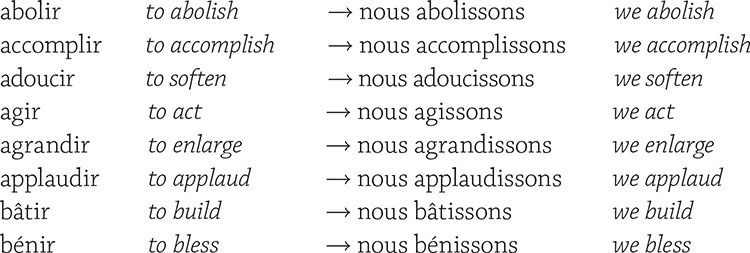
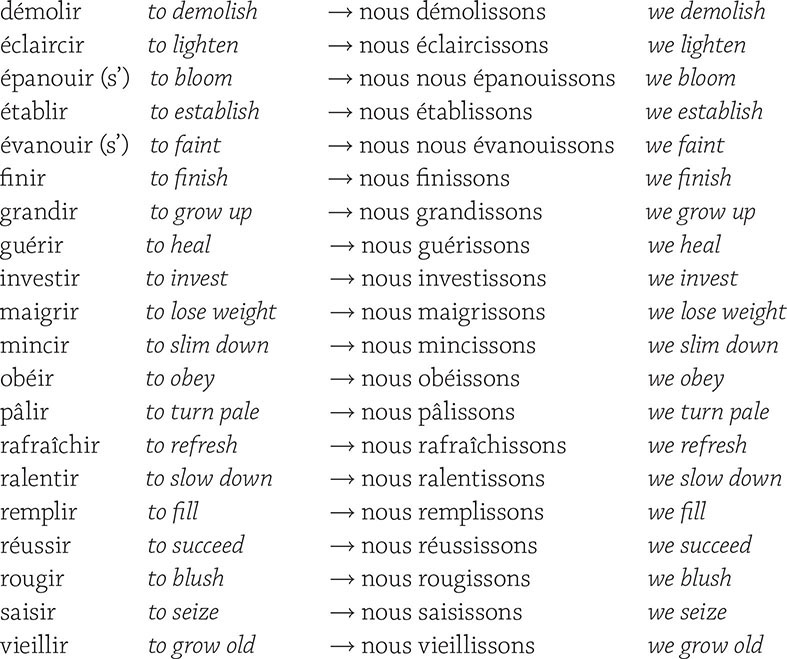

The second type of -ir verb drops the -ir of the infinitive then adds the appropriate ending. Let’s take a look at an example:

Some other common irregular -ir verbs are:
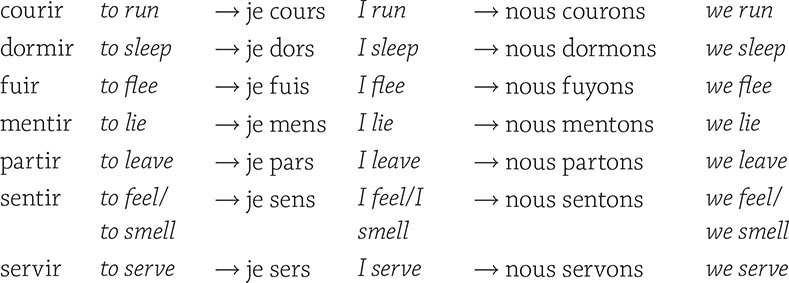
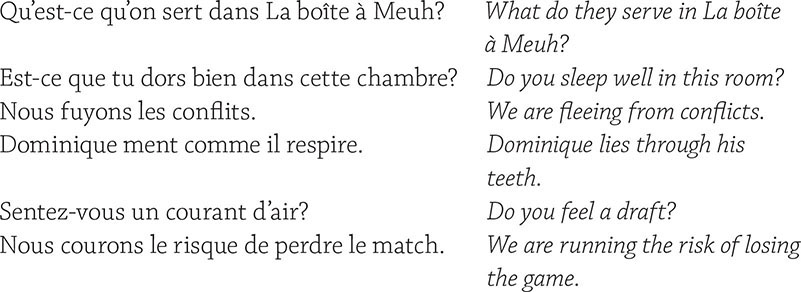
Verbs that End in -llir, -frir, or -vrir
Most verbs that end in -llir and all that end in -frir or -vrir are conjugated like regular -er verbs.

Here are some similar common verbs:


The Verbs Tenir and Venir
Tenir and venir are not only incredibly useful by themselves, but they are the building blocks of countless verbs and idiomatic expressions.
The Verb Tenir
Tenir (to hold) is an irregular -ir verb. It is used in many idiomatic expressions and can be followed by à or de. Additionally, it has several key derivatives, like soutenir (to support), maintenir (to maintain), entretenir (to upkeep), and contenir (to to hold, to contain).

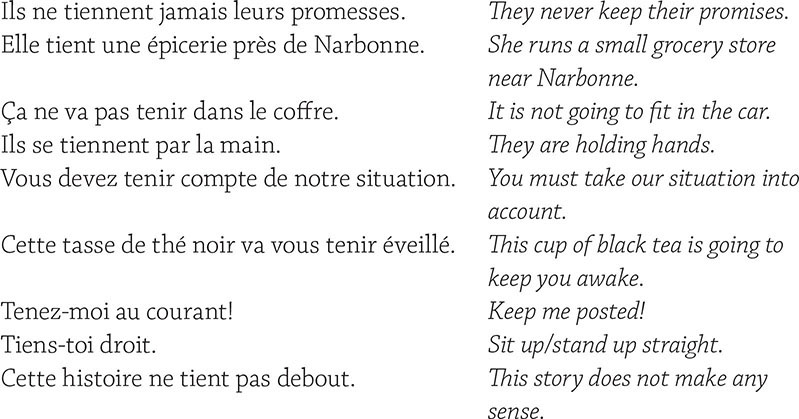
■ Tenir à

■ Tenir de

The Verb Venir
The verb venir (to come) is another irregular -ir verb. And it has several key derivatives, like devenir (to become), se souvenir (to remember), intervenir (to intervene), prévenir (to inform, to prevent), and provenir (to originate, to derive).


The Immediate Past Tense
Similar in structure to the futur immédiat, the passé immédiate uses an infinitive after the conjugated form of venir. With venir, however, you need the preposition de to link the conjugated verb with the infinitive. And it expresses an action that has just taken place.

Negation Words
When you don’t agree with somebody or want to contest the veracity of one’s claim, you’ll use negation words.
ne… pas

If the ne precedes a verb starting with a vowel sound or a mute h, ne becomes n’.

Additional Negation Words
Negations can be used in many other ways. Let’s take a look at the possibilities:
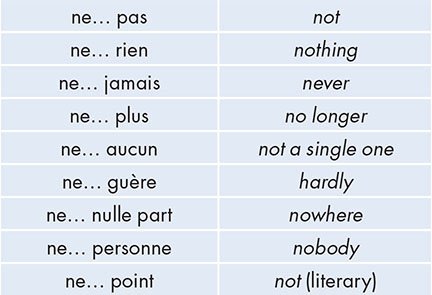


The negation ni... ni (neither…nor) precedes each of the nouns it negates. When the definite articles le, la, and les are used, they remain in the sentence.

When the indefinite article is used in the original sentence, it gets dropped in the negative form.

Demonstrative Adjectives
Sometimes you need to be very specific in identifying items, and to do so, you have to use demonstrative adjectives (this, that, these, those). Like all adjectives in French, they agree in gender and number with the noun they modify.
masculine singular

Note that the singular demonstrative adjective ce adds a t when a vowel or an h sound follows.
feminine singular

masculine and feminine plural

To make a distinction between two elements, -ci and –là are added to the demonstrative adjectives.

The Cardinal Numbers 60 to 100
We have learned zero to sixty and are now ready to keep counting. Cardinal numbers are the numbers used for counting and designating quantity.
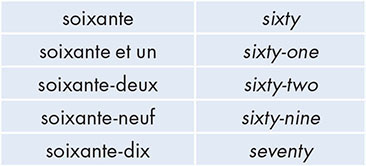
From seventy to seventy-nine, you add the teen numbers:
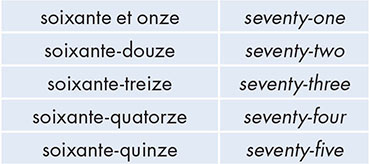
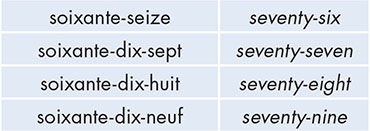
Eighty is really four times twenty. So from eighty to eighty-nine, you’ll keep adding to quatre-vingts. Note that quatre-vingts has an s. But once you attach another number to quatre-vingts, the s will drop.
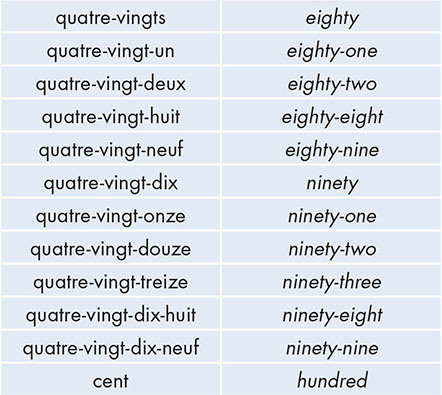
Now we have reached one hundred! Let’s keep going.

Add an s to cent for numbers above one hundred except when cent is followed by another number.


Never add an s to mille.

 DIALOGUE Quel est votre passe-temps favori? What’s your favorite hobby?
DIALOGUE Quel est votre passe-temps favori? What’s your favorite hobby?
Benoît, Alexandra, and Quentin meet in Nantes at La boîte à Meuh, a trendy frozen yogurt establishment renowned for its organic milk from Brittany. They discuss their hobbies and try to come up with a plan for the weekend.
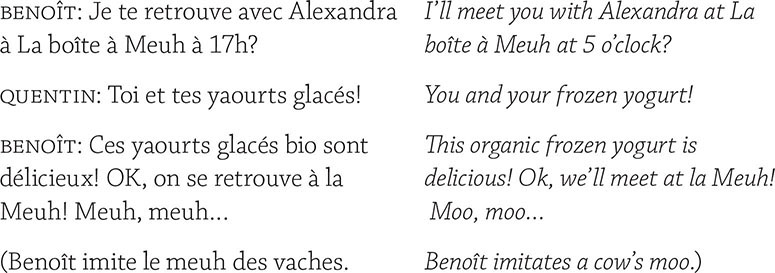

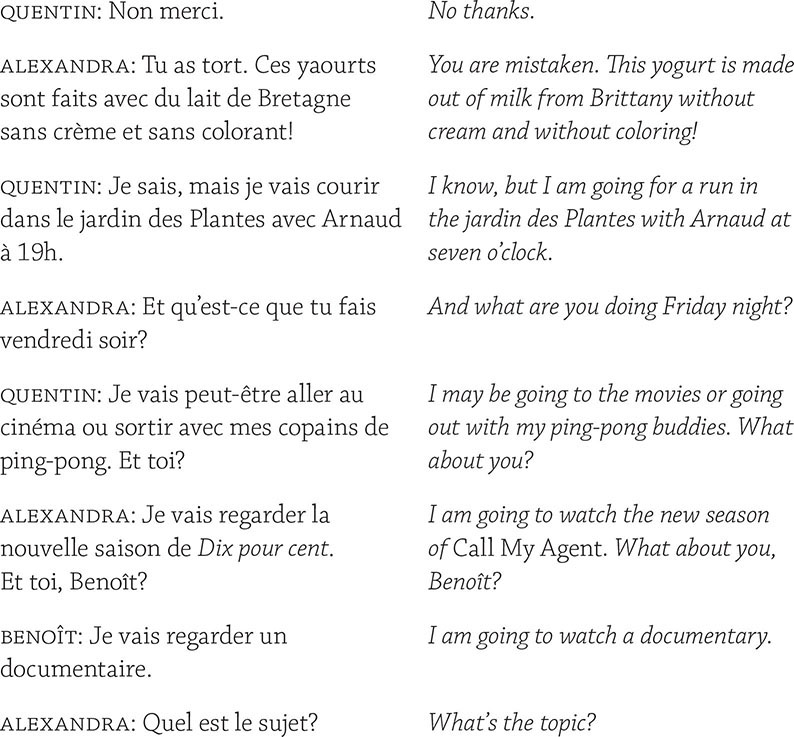
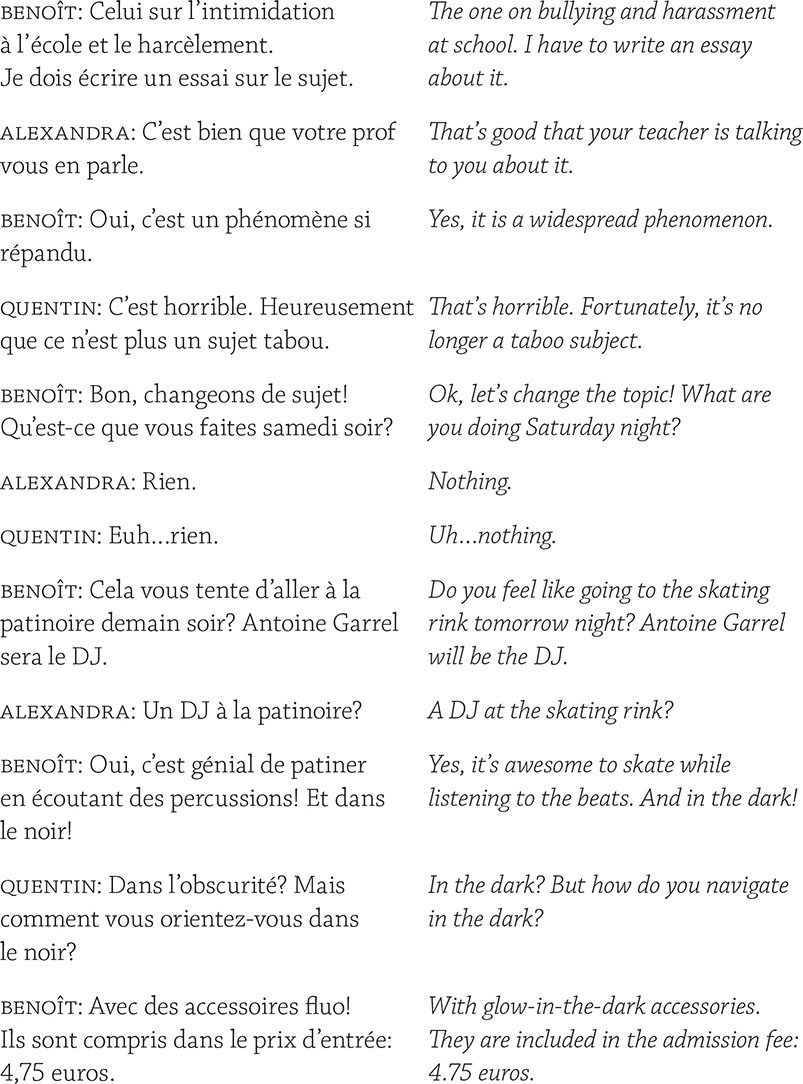
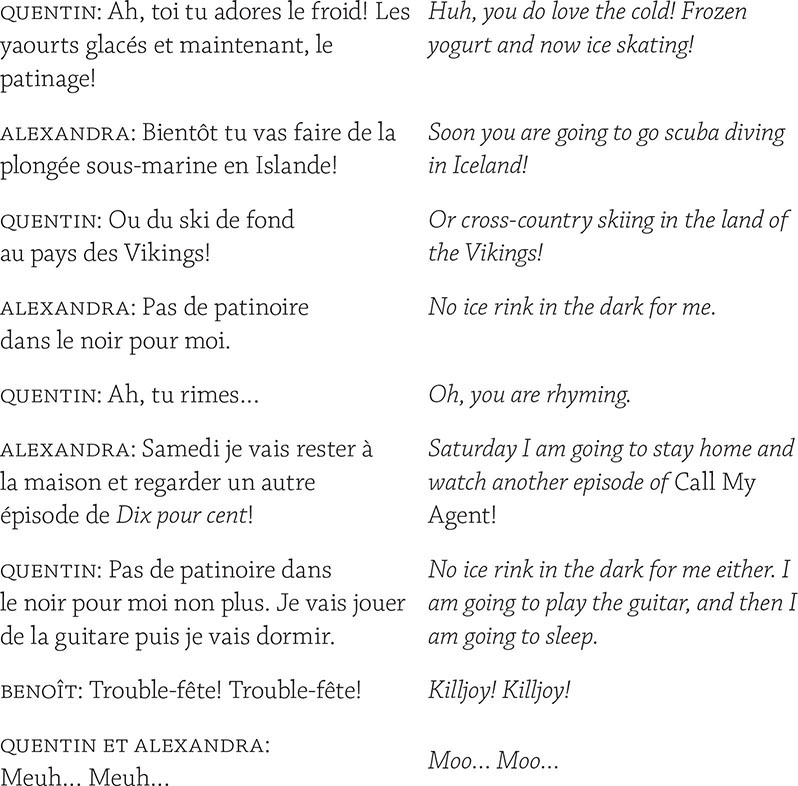
EXERCISES
EXERCISE 5.1
Translate the following questions using inversion and the vous form when necessary.
1. How much does a frozen yogurt cost?
2. Where is the Nantes skating rink?
3. What are you doing on Saturday?
4. How are you doing?
5. Why do you want to skate in the dark?
6. When is she arriving in Nantes?
7. At what time are they going to the movies?
8. Who is playing the guitar?
9. Why are you listening to Benoît?
10. How much do the accessories cost?
EXERCISE 5.2
Conjugate the following verbs in the present tense.
1. Il (choisir) _______________ un yaourt glacé à la pistache.
2. Je (agir) _______________ avec prudence.
3. Ils (bâtir) _______________ une grande maison.
4. Nous (finir) _______________ notre essai.
5. Elle (agrandir) _______________ sa boutique.
6. Nos enfants (grandir) _______________ vite.
7. Vous (choisir) _______________ un parfum de glace différent.
8. Nous (applaudir) _______________ le DJ à la patinoire.
9. Je (réfléchir) _______________ à nos projets pour le week-end.
10. Elles (réussir) _______________ tout ce qu’elles entreprennent.
EXERCISE 5.3
Match the items in the two columns. Choose the most logical answer.
EXERCISE 5.4
Conjugate the following verbs in the present tense.
1. Nous (sortir) _______________ avec nos copains ce soir.
2. Qu’est-ce que je vous (servir) _______________?
3. On (sentir) _______________ un parfum délicat.
4. Nous (dormir) _______________ la fenêtre ouverte.
5. À quelle heure (partir) _______________ -vous?
6. Ils (mentir) _______________ trop souvent.
7. Pourquoi est-ce que tu (courir) _______________? Tu es pressé?
8. Ils (fuir) _______________ leur pays en guerre.
9. Ils (servir) _______________ un plateau de fromages.
10. Je (partir) _______________ ce soir pour Genève.
EXERCISE 5.5
Match the items in the two columns. Choose the most logical answer.
EXERCISE 5.6
Conjugate the following verbs in the present tense.
1. On (découvrir) _______________ toujours de nouvelles étoiles dans le ciel.
2. En général, est-ce que tu (offrir) _______________ des tournesols ou des orchidées?
3. Est-ce qu’ils (souffrir) _______________ à cause de la pauvreté?
4. Qui (ouvrir) _______________ le bal cette année?
5. Ils nous (accueillir) _______________ toujours chaleureusement.
6. La nouvelle saison d’Hippocrate commence ce soir. Je (bouillir) _______________ d’impatience!
7. Je (recueillir) _______________ le maximum de documents.
8. Quentin (découvrir) _______________ un magasin de yaourt glacé tous les jours.
9. Vers quelle date est-ce que vous (cueillir) _______________ vos mirabelles?
10. Les journalistes qui (couvrir) _______________ l’ONU jouent un rôle important.
EXERCISE 5.7
Match the items in the two columns. Choose the most logical answer.
EXERCISE 5.8
Conjugate the following verbs in the present tense.
1. Nous (cueillir) _______________ des champignons dans la forêt.
2. Je (ouvrir) _______________ les fenêtres quand il fait chaud.
3. Vous (sortir) _______________ ce soir?
4. Ils (démolir) _______________ l’édifice en ruine.
5. Nous (grossir) _______________ toujours un peu en vacances.
6. On (vieillir) _______________ moins vite si on fait du sport.
7. À quelle heure (finir) _______________ -ils ce soir?
8. Elles (mentir) _______________ tout le temps!
9. Qu’est-ce que vous nous (servir) _______________ ce soir?
10. Je (courir) _______________ plus vite que Quentin.
EXERCISE 5.9
Conjugate the following verbs in the present tense.
1. Nous (tenir) _______________ à notre vieille voiture.
2. Je (revenir) _______________ dans un instant.
3. Ces mangues (venir) _______________ du Burkina Faso.
4. Namous (tenir) _______________ sa fille par la main.
5. Ils (tenir) _______________ à leurs idées.
6. Ces informations (provenir) _______________ d’une source sûre.
7. Est-ce que tu (tenir) _______________ de ta mère ou de ton père?
8. Ce qu’elle (tenir) _______________ dans sa main, c’est un vase égyptien.
9. D’où (venir) _______________ -tu?
10. Ce journal nous (tenir) _______________ au courant de l’actualité.
EXERCISE 5.10
Rewrite the following sentences using the passé immédiat.
1. Ils commencent un nouveau livre.
2. Je fais un jogging dans le bois de Boulogne.
3. Elle prononce un discours.
4. J’écoute le nouvel album de Mika.
5. Vous révélez la vérité.
6. Nous remplaçons les meubles de son bureau.
7. Il place un vase de fleurs sur la table.
8. Ils découvrent un morceau de météorite.
9. Nous achetons un sofa bleu nuit.
10. Elle chante une chanson.
EXERCISE 5.11
Translate the following sentences. When appropriate, use the vous form.
1. It is hot. I just opened the window.
2. We just picked some raspberries.
3. You just called Benoît.
4. I just read an article in Le Monde.
5. They just chose a restaurant for the wedding.
6. Cécile just bought a Navigo Pass.
7. She just filled out the form.
8. I just finished my essay.
9. He just served us a delicious pizza.
10. They just celebrated Quentin’s birthday.
EXERCISE 5.12
Rewrite the following sentences using ne… pas.
1. Je vais au cinéma ce week-end.
2. Elle parle espagnol.
3. Il dort huit heures par nuit.
4. Vous jouez de la guitare.
5. Ils vont à la patinoire.
6. Tu cherches la rue des Carmes.
7. Nous écoutons le nouvel album.
8. Elle aime le froid.
9. Nous nageons dans la mer.
10. Nous restons à la maison le samedi soir.
EXERCISE 5.13
Translate the following sentences using the tu form when necessary.
1. He does not know anyone in Paris.
2. They do not do anything to help Jean-Claude.
3. I never eat French fries.
4. You no longer play ping-pong with your friends.
5. They sell neither ice cream nor frozen yogurt.
EXERCISE 5.14
Fill in the blanks with the correct demonstrative adjective.
1. Je n’aime pas _______________ sport. C’est trop violent.
2. Est-ce que vous aimez _______________ lunettes de soleil?
3. Ne prends pas_______________ veste! Prends l’autre!
4. _______________passe-temps est mon favori.
5. Je préfère réserver dans _______________ hôtel.
6. Connais-tu _______________ ancien album de Cœur de pirate?
7. Je ne vais pas acheter _______________ ordinateur aujourd’hui.
8. J’ai du mal à écrire _______________ essai.
9. Ils vont aimer _______________ pâtisseries marocaines.
10. Connaissez-vous _______________ deux écrivains?
EXERCISE 5.15
Write out the following numbers in word form.
1. 88
2. 76
3. 100
4. 101
5. 246
6. 80
7. 1000
8. 91
9. 99
10. 2010

LE COIN DES CRÉATEURS
LES AMOUREUX DU MODE INFINITIF
Create a story line using as many -ir verbs you learned in this chapter as possible, following the example below:
Travailler, c’est…
agrandir
démolir
bâtir
investir
courir
remplir
réussir
et vieillir…
Try to make up a similar list with:
Voyager, c’est…
Déménager, c’est…
Chanter, c’est…
Danser, c’est…
Écrire, c’est…
NOTE CULTURELLE
FRANCE AND SPORTS: IT’S NOT JUST BOULES
The game of boules used to be the stereotypical image of French sports. A relative of lawn bowling, it is typically played by two teams of one, two, or three people who take turns throwing or rolling a ball (boule) as close as possible to a target ball. The team that comes closest is the winner. While the game is still popular, it is far from defining French sports.
Much like the United States, France is a country that is crazy for sports, both professional and amateur. In team sports, it is a powerful presence in major world and European competitions. The French have a national team, known as les Bleus (for the blue color of their uniforms) for rugby, basketball, ice hockey, and, of course, soccer. France is the current holder of the World Cup in men’s soccer, known as le football or le foot. Individual French athletes are also world famous, numbering among the medal winners in both the winter and summer Olympics and other international sporting events.
The French are also recreational athletes, frequenting gyms and jogging paths with great enthusiasm, and they engage in a wide variety of activities. France’s varied topography includes extensive coastline and beaches on the Atlantic and Mediterranean as well as rugged mountains in the Alps and Pyrenees. As a result, sports like surfing and paragliding are as accessible as skiing and snowboarding.
For those who are more daring, extreme sports are also practiced, with two that are particularly notable for having been invented in France: parkour and flyboarding.
Parkour is a sport in which practitioners, known as traceurs in French, overcome barriers or obstacles, both artificial or natural, using agile movements, to get from one point to another as quickly and efficiently as possible. It includes running, free-running, climbing, swinging, vaulting, jumping, rolling, crawling, and other movements, all without the use of equipment. The word “parkour” comes from the term parcours du combattant, the French term for the type of obstacle course typically used in military training. Its origin as a sport dates back to the 1990s and to one man, David Belle, who is considered by many to be its originator. He developed it based on a system for building strength and endurance pioneered by his father, Raymond Belle, and used the media exposure he received as an actor and stuntman to help popularize it.
Parkour is an activity that can be practiced alone or with others and is usually carried out in urban spaces, though it can be done anywhere. It requires seeing one’s environment in a new way and imagining the potential for navigating it by movement around, across, through, over, and under its features. Avid parkour practitioners can now be found running up walls in Paris, London, Boston, and New York, jumping off and around them, and vaulting their way over obstacles. In July and August every year, Parkour Generations, one of the sport’s leading professional organizations, conducts a camp in the French Alps to teach and train parkour practitioners at the beginner and advanced levels. What better way to learn a truly French extreme sport than in the country where it was invented?
Flyboard is the commercial name for a type of hoverboard that uses hydrojet propulsion to drive the board into the air to perform a sport known as hydroflying or flyboarding. The rider stands on a board connected to a watercraft by a long hose. Water is forced through the hose under pressure to a pair of boots with jet nozzles underneath, which provide thrust and propel the rider into the air. Invented in France in 2012 by watercraft rider Franky Zapata, it became world famous when he flew over the parade on Bastille Day in July 2019. Less than one month later, on August 4, 2019, Zapata made history when he became the first person to cross the English Channel on a hoverboard powered by a backpack full of fuel. He did so in just over 20 minutes.
For those wishing to try the sport on a more modest scale, several flyboard rental companies have recently been established in the city of La Rochelle, in southwestern France. Boards can be rented by the hour. Instruction is, of course, a must. As it is still relatively new, it can be expensive, but with time and more practitioners, it will certainly become less so.
 KNOW
KNOW Où is where and ou is or. Accent marks change everything!
Où is where and ou is or. Accent marks change everything!

